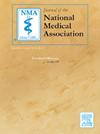Personal reflections on race-based medicine: narrative analysis of a case study using a situated lens
IF 2.5
4区 医学
Q1 MEDICINE, GENERAL & INTERNAL
引用次数: 0
Abstract
Background
Race-based medicine was initially established to risk-stratify patients using algorithms based on biological similarities. This generalized form of medicine resulted in harmful practices and health inequities. Although race-based medicine has received increasing attention as a harmful practice contributing to structural and systemic racism in medicine, the individual patient perspective remains relatively under-studied, particularly in obstetrics. This qualitative case study uses a situated lens to explore the individual experience and perspective of race-based medicine in perinatal care.
Methods
This was an institutional review board approved qualitative study utilizing semi-structured interviews as part of a larger study investigating the birth experiences of military beneficiaries. The interview was recorded and transcribed with data inductively analyzed using narrative analysis with positioning theory to identify positions and lived experiences during the individual's care experiences.
Results
Narrative analysis yielded the following themes: (1) self-identity; (2) reinforcing racial sensitivity; (3) health individualization; (4) internal conflict with external perception and honesty; (5) trust and respect; (6) resisting negative influence and press/stories; (7) intellectualization; and (8) fear vs. empowerment for personalized birth wishes. Each theme represented valid concerns patients may experience with race-based medicine in a healthcare setting.
Conclusions
The application of race-based medicine during prenatal care may harm the relationship between pregnant individuals and clinicians, leading to an overall negative experience and erosion of trust in the healthcare system. Implementing personalized race-conscious healthcare rather than race-based medicine is essential to improving patient-doctor relationships by building trust and eliminating unnecessary medical practices.
对基于种族的医学的个人反思:一个案例研究的叙事分析,使用一个定位的镜头。
背景:基于种族的医学最初是为了使用基于生物相似性的算法对患者进行风险分层而建立的。这种普遍化的医疗形式导致有害做法和卫生不公平。尽管以种族为基础的医学作为一种有害的做法受到越来越多的关注,有助于医学中的结构性和系统性种族主义,但个体患者的观点仍然相对缺乏研究,特别是在产科。这个定性的案例研究使用了一个定位的镜头,以探索个人的经验和观点,以种族为基础的医学在围产期护理。方法:这是一项机构审查委员会批准的定性研究,利用半结构化访谈作为调查军事受益人出生经历的更大研究的一部分。对访谈进行记录和转录,并运用定位理论的叙事分析对数据进行归纳分析,以确定个体在护理经历中的位置和生活经历。结果:叙事分析得出以下主题:(1)自我认同;(2)强化种族敏感性;(3)健康个性化;(4)内部与外部感知和诚实的冲突;(五)信任和尊重;(六)抵制负面影响和新闻报道;(7)智能化;(8)对个性化出生愿望的恐惧vs.授权。每个主题都代表了患者在医疗保健环境中可能遇到的基于种族的医学问题。结论:在产前护理中应用基于种族的药物可能会损害孕妇个体与临床医生之间的关系,导致整体负面体验和对医疗保健系统的信任的侵蚀。通过建立信任和消除不必要的医疗实践,实施个性化的种族意识医疗,而不是基于种族的医疗,对于改善医患关系至关重要。
本文章由计算机程序翻译,如有差异,请以英文原文为准。
求助全文
约1分钟内获得全文
求助全文
来源期刊
CiteScore
4.80
自引率
3.00%
发文量
139
审稿时长
98 days
期刊介绍:
Journal of the National Medical Association, the official journal of the National Medical Association, is a peer-reviewed publication whose purpose is to address medical care disparities of persons of African descent.
The Journal of the National Medical Association is focused on specialized clinical research activities related to the health problems of African Americans and other minority groups. Special emphasis is placed on the application of medical science to improve the healthcare of underserved populations both in the United States and abroad. The Journal has the following objectives: (1) to expand the base of original peer-reviewed literature and the quality of that research on the topic of minority health; (2) to provide greater dissemination of this research; (3) to offer appropriate and timely recognition of the significant contributions of physicians who serve these populations; and (4) to promote engagement by member and non-member physicians in the overall goals and objectives of the National Medical Association.

 求助内容:
求助内容: 应助结果提醒方式:
应助结果提醒方式:


